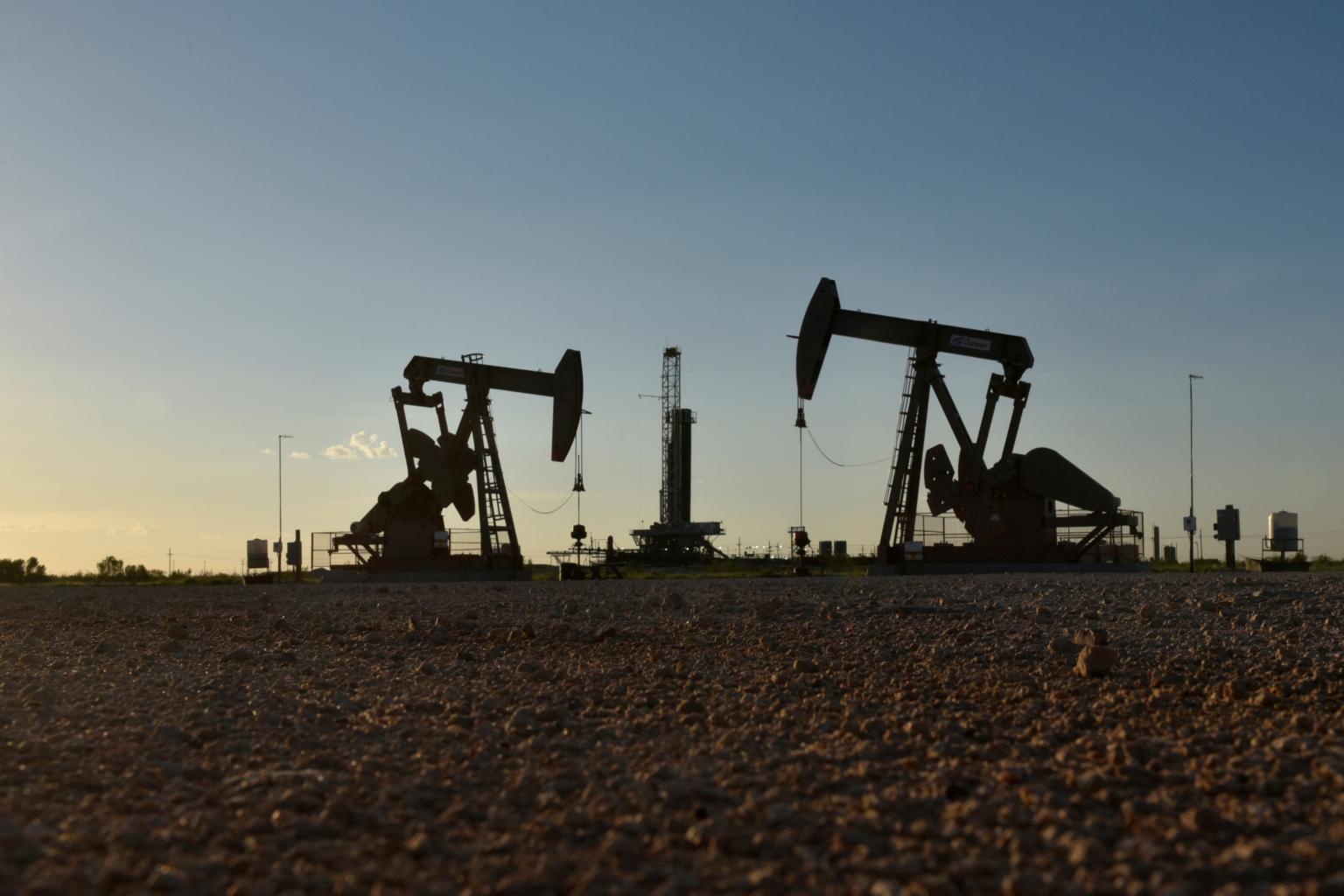Oil resumes slide after Saudis up ante on price war with vow to boost production further
Sign up now: Get ST's newsletters delivered to your inbox

In a photo taken on Aug 22, 2018, pump jacks operate in front of a drilling rig in an oil field in Midland, Texas.
PHOTO: REUTERS
Follow topic:
SINGAPORE (BLOOMBERG) - Oil's rebound from its biggest crash in a generation faltered after Saudi Arabia said on Wednesday (March 11) it would boost its production capacity even more, raises the stakes in a price war with Russia and US shale producers.
Brent crude for May settlement fell 1 per cent to US$36.84 a barrel on the London-based ICE Futures Europe exchange as of 7:35am in London after being up as much as 6.7 per cent earlier.
West Texas Intermediate crude for April delivery dropped 1.2 per cent to US$33.94 a barrel on the New York Mercantile Exchange after swinging between a gain of 5.8 per cent and a loss of 2.4 per cent.
Saudi Aramco said on Wednesday it was making maximum efforts to boost its oil production capacity to 13 million barrels a day from 12 million after pledging to supply a record 12.3 million barrels a day next month in a massive increase. It didn't specify when it would reach the higher capacity.
Oil had plunged as much as 31 per cent on Monday on its lowest since the 1991 Gulf War after Saudi Arabia and Russia ignited an oil price and supply war that threatens to overwhelm a market already reeling from the impact of the coronavirus outbreak on global demand.
Aramco had said on Tuesday it will supply 12.3 million barrels of crude a day to the market starting on April 1 - more than its current capacity. Russia responded by saying it had the ability to add 500,000 barrels a day in supply.
Saudi Arabia has a bigger cushion of spare production capacity than Russia. The kingdom announced plans more than a decade ago to boost and sustain its capacity at a level of 12 million barrels a day, and it has worked to maintain that by expanding fields including Manifa and Shaybah.
In the US, President Donald Trump pitched a payroll tax holiday and relief for the travel and hospitality sectors to combat the virus's impact, while some Republican senators suggested a bailout for the shale industry.
The Trump administration's willingness to revive the economy comes after the disintegration of Opec+ and subsequent plunge in oil prices threatened the US shale industry and spurred an indiscriminate sell-off in markets already reeling from the coronavirus. However, investor hopes were tempered when the president didn't appear at a White House briefing Tuesday after promising a day earlier he'd hold a news conference to announce major stimulus.
"The market rally based on Trump's economic stimulus alone is unlikely to be sustainable" given the amount of crude that will soon be hitting the market, said Howie Lee, an economist at Oversea-Chinese Banking Corp. "Any meaningful rebound will either come from coronavirus fears fading away, or Saudi Arabia and Russia returning to the negotiating table."
Trump spoke with Mohammed bin Salman by phone before the Saudi crown prince escalated the oil-price war on Tuesday, according to two people familiar with the call. Russia's top producer Rosneft PJSC is also planning to ramp up output in April, a person close to the company said. Iraq and Nigeria followed in their wake and said they would increase crude shipments next month.
Meanwhile, the American Petroleum Institute reported that US inventories increased by 6.41 million barrels last week, according to people familiar with the data, highlighting the lack of demand. That would be the seventh straight weekly expansion if confirmed by Energy Information Administration figures due later on Wednesday.
Expectations for a "major" fiscal stimulus package by the US have underpinned sentiment, Stephen Innes, chief Asia market strategist at AxiCorp Ltd., said in a note. But there's still potential for this to fall through, he said.

